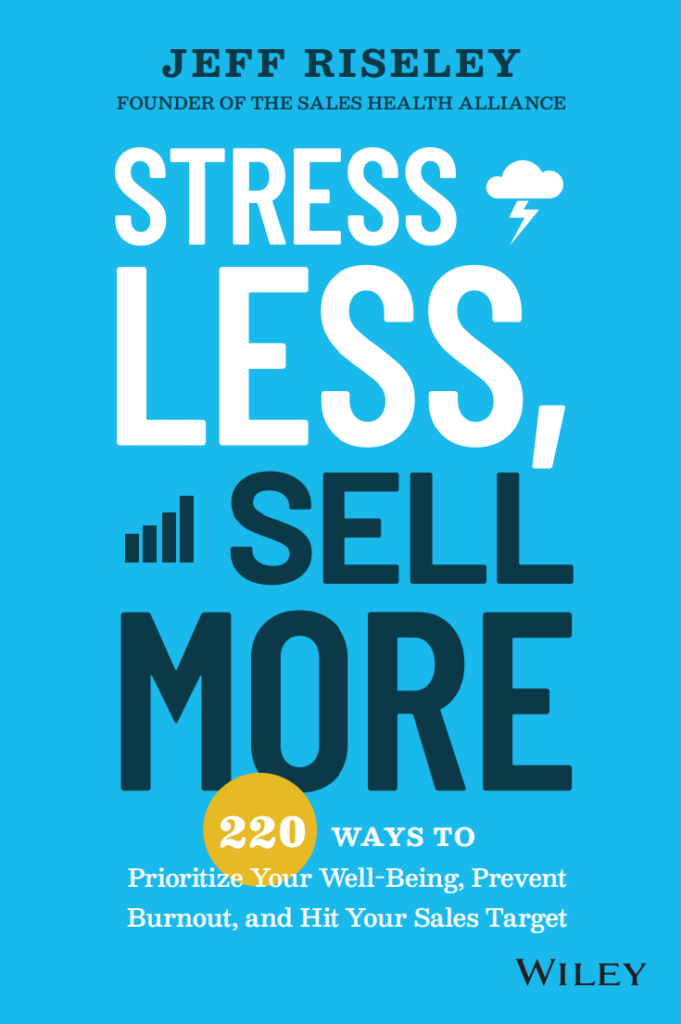The achievability of sales targets are always a constant debate between sales leaders and reps. Leaders tend to believe targets are achievable, while most sales reps tend to believe they’re often out of reach.
As a result, I’ve been struggling to answer this question for the last few years:
Are most sales targets actually not achievable, or do the vast majority of sales reps believe they’re not achievable because they’re simply struggling with their Mental Health?
This has been a burning question of mine since I started to collect Mental Health data on salespeople. Even more so lately, since the latest data from the 2022 Mental Health in Sales report showed 63% of salespeople are struggling with their Mental Health.
To help bring you up to speed on the importance of this question; we first have to understand how sales targets, the perception of those targets (achievable or not) and Mental Health are all interrelated.
Seeing A Sales Target For The First Time
When a sales rep sees their new sales target for the first time, two thoughts will subconsciously run through their mind:
- What is required of me?
- Do I have the personal resources to cope and achieve this goal?
Based on this assessment, the rep will either perceive the stress associated with their sales target as positive or negative.
When it’s positive, they view their target as a challenge in which they’re motivated to approach.
When it’s negative, they view their target as a threat they don’t feel equipped to handle. Something that could cause them harm in the future like earning less money or losing a promotion if they fail to meet this goal.
In this threatening second scenario – a cascade of stress hormones like adrenaline and cortisol are released into their bodies at unhealthy levels.
When these hormones get too high, they move reps out of an optimal performance zone where they feel challenged and motivated; into a low performance zone where they feel anxious and panicked.
To make matters worse, many reps get stuck in this low performance zone.
As the month or quarter progresses, anxiety levels continue to remain elevated and sales performance continues to suffer, making it nearly impossible to hit target.
But here’s where things get tricky…
Perception is fluid and ALWAYS changing in response to our Mental Health (i.e. where we are on the Mental Health spectrum on any given day).
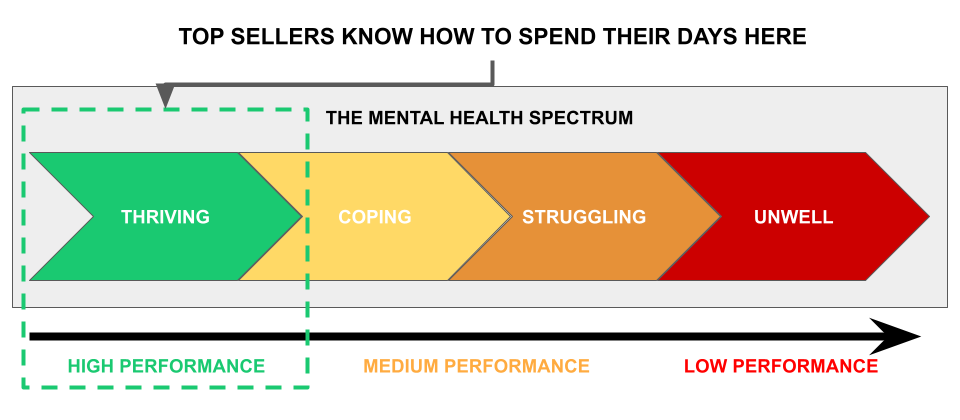 Present a sales rep with a sales target on a day when they feel well rested and thriving and they’re more likely to perceive the target as a challenge. Present that same target to the same rep on a day when they’re coping, struggling and unwell and it’s more likely to be perceived as a threat.
Present a sales rep with a sales target on a day when they feel well rested and thriving and they’re more likely to perceive the target as a challenge. Present that same target to the same rep on a day when they’re coping, struggling and unwell and it’s more likely to be perceived as a threat.This happens due to those unhealthy levels of stress hormones warping their perception into a more negative, emotional and threatened state.
Hence a chicken and the egg scenario exists.
Are reps receiving sales targets that are truly unachievable and threatening; like being given a goal they have no hope of achieving, which impacts their Mental Health?
Or are reps consistently showing up burnt out, anxious and depressed every month, that no matter what sales target they receive – it will always be perceived as not achievable?
The reason why this is an important question to answer is because achievable targets are correlated with better Mental Health and sales performance.
Achievable Sales Targets And Mental Health
This can be seen in the data on 770 salespeople below, from the 2021 Mental Health In Sales report mentioned above.
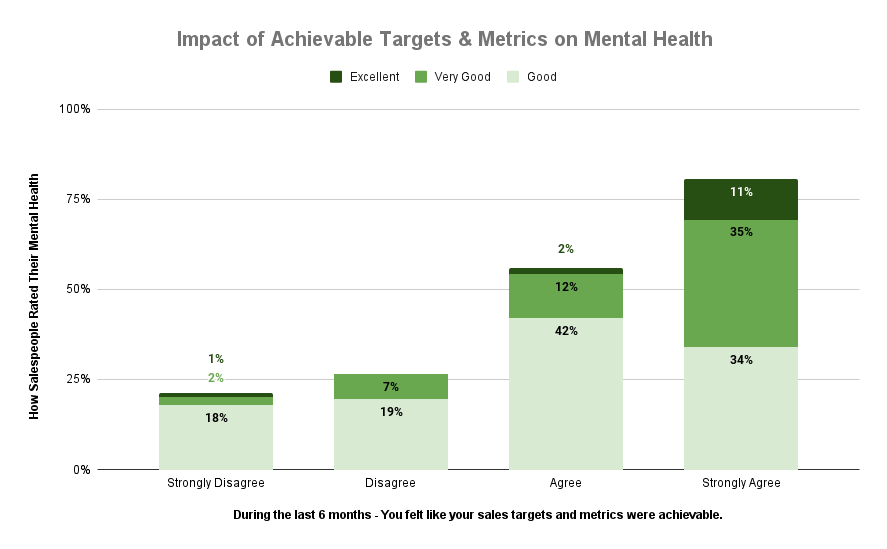
Among salespeople who Strongly Agreed that they felt like their sales targets were achievable; 80% described their Mental Health as Good or better.
When salespeople Strongly Disagreed that they felt like their sales targets were achievable; only 21% described their Mental Health as Good or better.
Therefore salespeople who perceive their sales targets as achievable are almost 4X more likely to rate their Mental Health as Good or better, compared to those who perceive their targets as unachievable.
Achievable Sales Targets And Sales Performance
A similar correlation exists between achievable targets and sales performance.
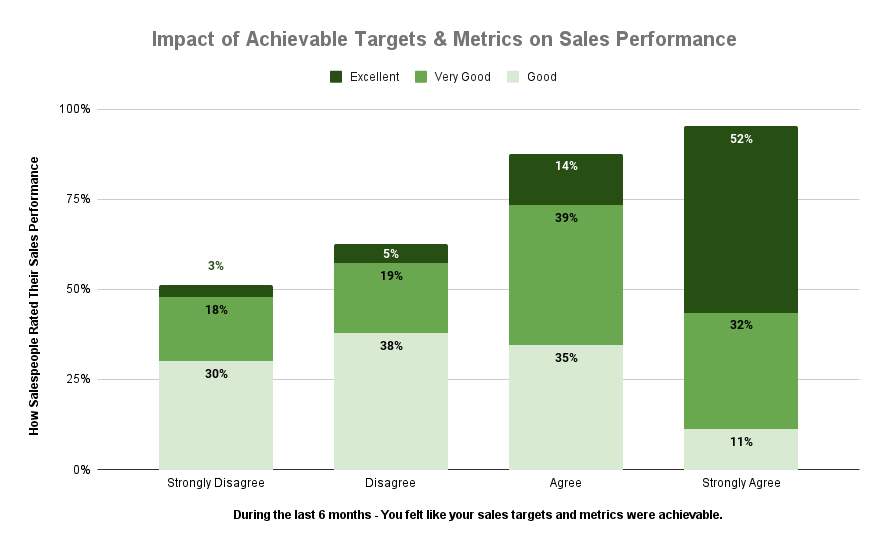
Among salespeople who Strongly Agreed that they felt like their sales targets were achievable; 52% described their sales performance as Excellent (dark green boxes).
When salespeople Strongly Disagreed that they felt like their sales targets were achievable; only 3% described their sales performance as Excellent.
That’s just simply insane.
Therefore, salespeople who perceive their sales targets as achievable are 17X more likely to rate their sales performance as Excellent, compared to those who perceive their targets as unachievable.
The data paints a crystal clear picture.
Having achievable sales targets are extremely important to Mental Health and sales performance.
Questioning The Achievability Of Targets In Sales
So getting back to the question at hand:
Are sales targets actually not achievable or are the vast majority of sales reps simply perceiving them as unachievable, due to poor Mental Health?
Well if we turn to the data we can find some answers.
Back in 2020 Salesforce released a white paper that highlighted 57% of salespeople were expected to miss quota. And a recent LinkedIn poll from Belal Batraw which garnered 688 responses showed the following:
What % of your sales team hit quota last fiscal year?
- Less than 25% (29% of responses)
- 25-50% (27% of responses)
- 51-75% (24% of responses)
- More than 75% (20% of responses)
Belal’s poll showed very similar data to Salesforce, with 56% of people saying that 50% or less of their team hit quota last year.
You might think this is a clear victory for sales reps. Proof that sales leaders are setting targets too high. But hang on a second. Remember the cycle we discussed above.
It is very possible that most reps are struggling with their Mental Health (58%), which causes them to perceive their targets as threatening. This spikes stress hormones, which creates performance issues and therefore leads to the vast majority of reps missing target.
A situation where sales targets are in fact achievable, but get missed due to declining Mental Health.
What Data Should We Look At?
We need to look at data pertaining to salespeople who rated their Mental Health the best.
These are the salespeople who are most likely to accurately perceive the achievability of their sales targets. They’re the ones who are happy, healthy and rested. They are the ones who are perceiving their environment logically, clearly and have their emotions in check.
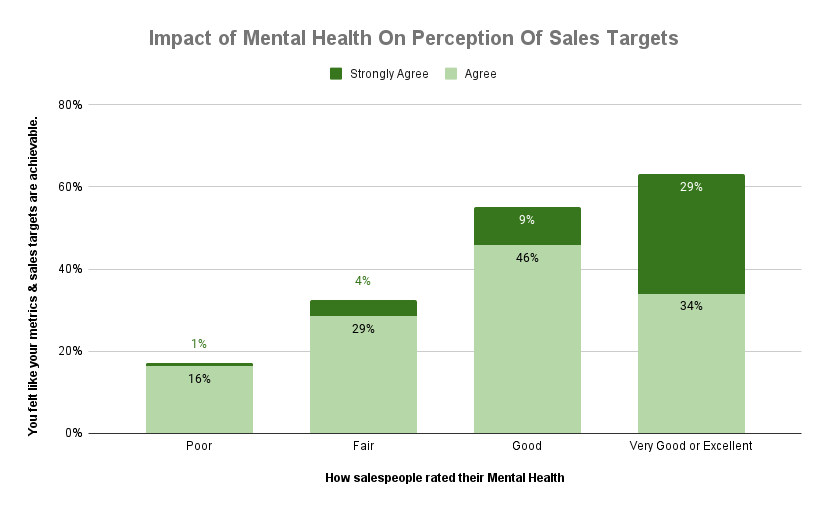
In the graph above you’ll clearly see the positive correlation between perspective and Mental Health that we’ve been discussing. As the Mental Health of salespeople improves, so does the percentage of salespeople who agree that their targets are achievable.
Within this data it’s important to note that when salespeople rated their Mental Health as Poor; only 17% Strongly Agreed or Agreed that their targets were achievable.
If we want to know if sales targets are actually achievable, then we want to pay attention to the fourth column on the right.
Among salespeople who rated their Mental Health as Very Good or Excellent, remember these are the salespeople perceiving their targets most clearly; 63% Strongly Agreed or Agreed that their targets were achievable.
Therefore, if we trust the judgement of these salespeople (which we should) and they believe 63% of targets ARE achievable; then we can say 37% of sales targets are not actually achievable and having a negative impact on Mental Health and sales performance.
Key Takeaways – What does this mean?
We’ve covered a lot in this article so it’s important for both reps and leaders to embrace the core concept outlined above. Target achievability, perspective, Mental Health and sales performance are all interrelated and impact each other.
To the sales reps reading this post, when you first receive your sales target at the start of the month or quarter; check in on yourself and take a pulse of where you are on the Mental Health spectrum.
If you find yourself coping, struggling or unwell – then you need to prioritize your Mental Health before you can accurately perceive the achievability of your target.
Taking care of yourself is step one.
To the sales leaders reading this post, you have two main takeaways.
Step one, do the math and work backwards from the targets you’re setting using conversion rates. Is it humanly possible for a salesperson to execute the volume of emails, calls, demos and proposals needed to achieve target?
If the answer is No – then your target is falling into that 37% bucket. There is almost a 0% chance your reps and team will achieve this target. Even worse, future targets are likely to be impacted too because Mental Health and performance will be crippled.
Step two, if sales targets are in fact reasonable and achievable, then Mental Health needs to be top of mind. You need to invest consistently into supporting the Mental Health of your sales team. This means arming them with Mental Health and resilience strategies that help them cope with stress, so they can show up healthy.
It’s only when sales reps are mentally healthy, when the achievability of targets will be perceived as a challenge, instead of a threat.
If you need help supporting the Mental Health of your sales team, then I’m here for you. I’ve built several successful programs designed to help improve sales performance through better resilience and Mental Health. You can view them by clicking on the link below.
If you enjoyed this article, you’ll love my book Stress Less, Sell More which has 220 ways to maximize your mental performance in sales.
About The Author

Jeff Riseley is currently the Founder of the Sales Health Alliance and Mental Health Advocate. With over a decade of sales experience – Jeff understands the importance of Mental Health in achieving peak sales performance.
Jeff combines his sales and Mental Health expertise to improve sales performance through mental health best practices. His strategies have helped sales teams become more motivated, resilient and better equipped to tackle stressful events within sales.


